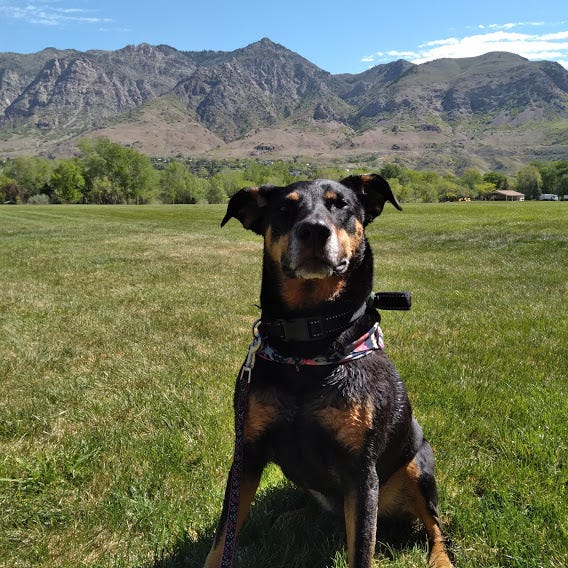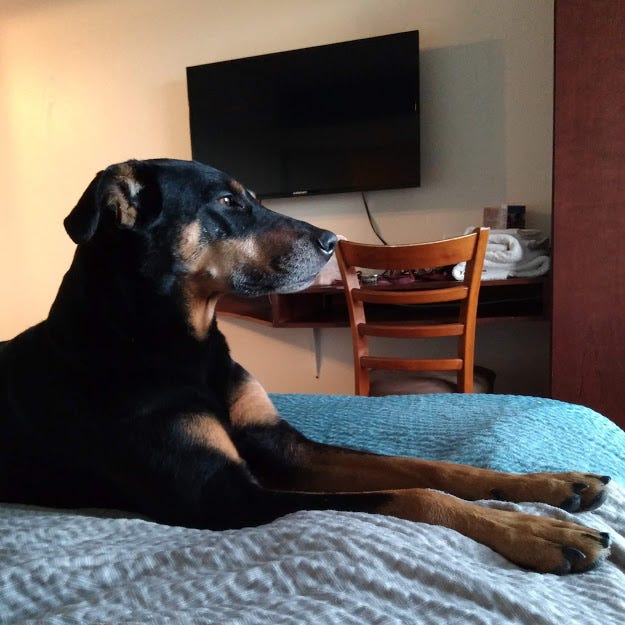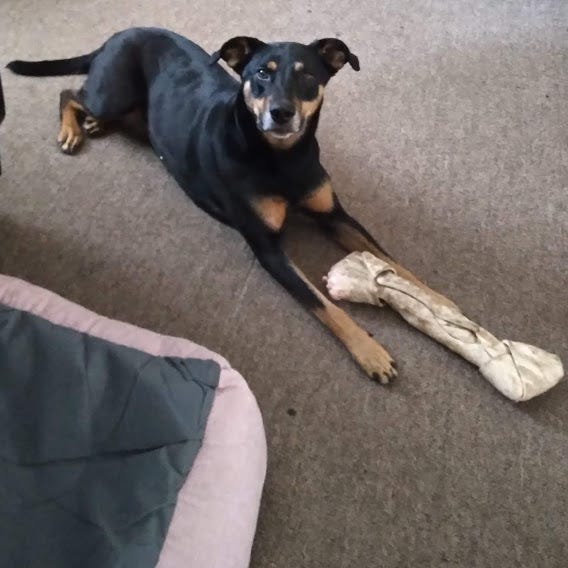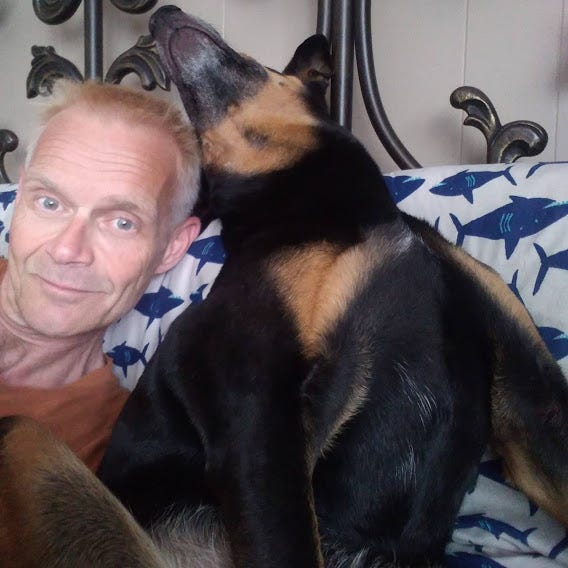Watered-down wanderlust, Part 3
Taking my baggage on the road and seeing what I chose to keep, not driving in a circle to find all of it waiting, was always the idea
“As the saying goes, it takes all kinds to make the world go around, though perhaps some shouldn't go quite so far around it as others.”
― Bill Bryson, In a Sunburned Country
It was over two weeks ago, on May 11, that I last posted about my uneventful-as-can-be, ten-day-long road-trip with my dog through some of the most sparsely populated areas of the United States, a trip then still in progress. Excluding some notes I made last night, that was also the last time I wrote about the trip, which in my mind didn’t really end until my mom left Boulder for home six days ago. As a result—and I’m surely not the first to come up with this idea—I’m shamelessly relying on Google Maps Timeline to fact-check some of my own “claims” or even learn new information, such as exactly what park I was in when I took a given photo.
I could use some of the few photos from that Timeline, a feature the federal authorities must cherish more than any Google users do, to describe what I saw in Idaho Falls on the morning I left it behind for perhaps the final time. But that would be cheating. (Besides, that’s what Instagram is for, along with promoting the value of obesity, emaciation and everything between as unique physical markers of ideal fitness).
What I saw on a sunny spring morning from my perspective as an intentional runner navigating a path toward a low-built downtown along the Snake River was a collection of people and structures that appeared to have been purposefully put there, rather than having spread there from someplace else as an eventuality of human copulation and the various industries required to support the practice. )I’m sure this is exactly the case; it’s just not an impression I often get.) The path extended for more than a mile on both sides of the 50-yard-wide river, and the number of fishermen—all men working alone—and Lycra-clad women pushing pricey strollers spoke to an appreciable level of inherent prosperity among the townsfolk. One the other side of the Snake lay a spread of chain motels like the one slightly upriver I had stayed in; people, mostly older and wearing hats and operating in small teams, were emerging from those properties to greet the midmorning and the traffic it has attracted to the path.
The town itself was flat for a few miles, and beyond that, the snow-capped mountains and roads whipsawing through valleys between them in the held few homes or other buildings.
Idaho Falls felt to me like a happy enough, stand-alone place, where the down-time earned at night after an unpretentious day’s labor seemed reason enough to treat life as, on balance, a modest but worthy reward for existing. Maybe it was the first sunny day people had seen in a while, or perhaps the sight of a playful dog wearing an excellent bandana teases out the nice in passerby more than it does here in Boulder, where the happiness stakes are morbidly high. But people seemed content enough. For someone with interests and inclinations as parochial as mine tend to be, any number of small river towns like Idaho Falls could prove a suitable lifelong home.
Before I got on the road at around noon, I committed to a stopping point in Ogden, Utah, less than 180 miles to the south. During the drive, which was spectacularly sunny and pleasant for the first time in days, I thought about some information I’d just learned from my mom—that my Aunt Connie had died at her home in Virginia. She was a pretty amazing…no, really, a thoroughly amazing woman.
I started life in late 1969 with only four aunts, excluding "great" ones--two by blood (my dad's two sisters) and two by marriage (the women my sister-less mother married). The one who married my now-deceased certified-child-molester uncle, and bore me three perennially-hard-to-find cousins before divorcing him during the Lynyrd Skynyrd administration, herself reportedly died in Florida some years back when a car she was sitting in was hit by a train; I basically forgot about that entire arm of the family years ago. Connie, married to my mom’s more presentable brother, is the second of these four women to pass.
The day after I learned about my Aunt Connie, I found out that my Aunt Emilie Kay, who was diagnosed with Alzheimer’s last year, had been moved to a more intensive level of care somewhere near Orlando, which must be bursting which such fluorescent-lit, semi-public mausoleums for the ostensibly still living.
There is a lot to see in comparing my Aunt Emilie’s life with that of my Aunt Connie. Both women came from basically nothing, one from the worst of hardscrabble post-World War II Ohio and the other a first-generation Mexican-American from a Texas border town. Aunt Emilie Kay started off as a nurse working for male doctors who in those days had free rein to disrespect her to their hearts’ and egos’ content, then was a nurse practitioner, then I think got another graduate degree, and then went to Rwanda in the 1990s to do humanitarian aid work. She’s also a (presumed) lifelong, unapologetic lesbian.
At some point late last year, she lost the ability to use a computer or cell phone. This happening was probably among her greatest fears—my grandmother, her mother, died nine years ago of Alzheimer’s at the age of 100 and a month. The potential genetics of all of this are not lost on me, but there is no point in worrying about such possibilities for the same reason I shouldn’t live in fear of global thermonuclear war.
Neither woman got a whole lot of help from the system along the way, to put it mildly. That so many of today's Wokish women think that posting Instagram “black squares” or bitching on Twitter about how hard it is to be a size-12 while dodging dieting apps amounts to activism, or the advancement of anything at all besides their own optional soul-scarring, is boggling enough on its own. But this class of aggrieved auto-pundits should be humbled beyond comprehension by biographies like Aunt Connie’s and Aunt Emilie’s. As an admitted do-little, I sure am.
Rolling into Ogden reminded of arriving in Boulder for the first time twelve years ago: A city built almost right into mountains spiking thousands of feet above the town itself, despite their peaks being no more than a couple of horizontal miles off. In this case, the mountains lay to the east of the city, a view I am not used to seeing.
Checking into the hotel offered no such grandeur. The proprietor, understandably accustomed to people who trash his $40-a-night rooms, demanded a $50 deposit on top of the room fee I’d already paid online. Something about the man’s demeanor—mostly his refusal to let me complete a single desultory sentence—suggested that he might try to keep this deposit no matter what my room looked like after I left, which proved to be the case even after I called him last week to question why a PENDING credit-card transaction was now appearing as COMPLETE.
I realize now how much I stack the odds against having fun on these trips by staying in Motel 6-like facilities ("Motel 6s"? I'm really not sure how to pluralize the name of the chain) in small, usually depressed towns. I can afford to upgrade to a Holiday Inn or something and just the difference in ambience in all those inevitable idle hours inside would probably add a lot of value to the trip overall. I'm not judging anyone, but the sight and sound of shabby drunk people arguing and chain-smoking and chain-drinking beside pools that have been choked with weeds for years tends to permeate one's mood when experienced night after night, no matter what pleasantries that day has delivered into other sensory sectors. Mainly because the sight and sound of shabby drunk people arguing and chain-smoking and chain-drinking nearby, no matter my private thoughts about them or level or empathy for the travails they vocalize without restraint toward each other and whatever unkempt Interstate ramp is closest, tend to emanate a brand of misery that is impossible to vaccinate one’s psyche against.
On the other hand, I usually wind up getting a refund for about one stay in every five or six after lodging a polite but pointed—and fully legitimate—noise or smoke complaint on receiving the e-mail survey the day after each stay ends. This is because the chain is aware that I make ample use of it—which I hope the fuck no one else is— and leave no wreckage in my wake, a low bar to clear even traveling with a dog that enjoys swimming in what frequently proves to be oily or decaying-plant-riddled stankwater. But if cost isn't really an issue—it's not like I make these trips a lot—then that shouldn't really matter, either.
The placement of the Ogden version of this hotel allowed me to stroll around the outskirts of downtown Ogden itself, a fun contrast between perfectly orderly lawns and homes maintained by beautiful, well-bred people and more run-down cars than I can remember seeing in one place since I was in Albuquerque two decades ago. I understand the concept of “haves” and “have-nots”—I live in a city a little bigger than Ogden that exemplifies this marvelously—but it almost seemed like the pretty people had to be driving all of those beater pickups and shitwagon Oldsmobile sleds from manufacturing eras of the past, because none of the smattering of homeless people I saw seemed to be driving anything.
I took a run along the Ogden River Trail, climbing a ways into a canyon, and was struck by how untroubled I am by crowds on a running path when the experience is new. Around here, not many people run with dogs, and of those who do, almost all identify as male. That gender ratio seemed more or less intact in this part of Utah, but the overall number of dog-human running pairs was a lot higher. So was the number of smiles, all of which I could see because people in Ogden don’t run with masks on, whatever other weird concepts many people in Utah tend to embrace as a matter of rollicking tradition.
On Thursday, I braced myself for the last leg of the trip, which I’d interrupt with one last motel stay, and drove back east into Wyoming. I had to be back in Boulder by Saturday afternoon to pick up my mom at the airport associated with Denver, which is practically in Kansas or maybe Nebraska, which meant I intended to spend Friday night in my own bed.
The weather became shitty again almost as soon as I was back over the border, where I stopped at a convenience store next to a place with a sign gleefully offering fireworks and another place with a sign announcing something like Come on in, Utah’s liquor laws and prices suck! Take your boasting points where you can get them. I indulged in having no idea what the liquor laws of either state were. The farther into the state I got, the more I got the impression of a place that has had a few close brushes with Mordor over time, and my thoughts again returned to “Six people per square mile in this entire state. Six. Quit acting fucking surprised.” So I continued looking at the misted-out, rolling expanse ahead while rain sniped away at the windshield, switching the radio back and forth between the two stations I could clearly get, one country and the other Jesus. These may have been the same station after a while.
I’m not sure why the sight of brownish-yellowish vegetation and almost nothing else is so universally depressing. Looking at the horizon in much of the country, even when mountains are rising along parts of it, is looking like a landscape drawn using only the handful of drab crayons no kid ever even plucks from the box, despite all of their bright and cheerful Crayola siblings being worn down to nubs. It just doesn’t kick the right set of neurons into gear in the right way for most people, even if they’re not used to anything better.
Rosie loves riding in the car under all circumstances, but my MINI overheats when it’s sunny, necessitating stops every hour or so. I usually have to piss someplace anyway, and when the car starts feeling like such a place, I pull over at the next exit or rest area. So when it rains, I’m able to drive on without as many breaks, which doesn’t seem like much of a luxury but is.
I spent an uneventful night in Rock Springs, recapitulating the first cross-country trip I ever took, starting on New Year’s Day, 1991, when I and a college buddy drove a Volkswagen Fox from Boston to San Francisco in four days. Along the way, we made evening stops in Sioux Falls, Rock Springs, and Reno, but mostly just traded driving duties. Along the way, he got three speeding tickets, while I got none. I don’t think he ever paid them—no reciprocity thirty years ago, along with no Google Maps Timeline—and, though probably not for this reason, he has a lot more money than I do now, much of it earned in San Francisco.
I ran four an hour in Rock Springs with Rosie through the kinds of quiet, generic subdivisions that seem to surround portions of small cities zoned for hotels and commerce. I felt good on this run and most of my runs during the trip, paying little attention to the fact that these runs were hillier than I was used to and also often situated at significantly higher altitudes. My Garmin says I averaged about 100 “activity minutes” a day over the course of the trip. I wonder what the non-running, non-walking, non-pushups-smelling-smoky-motel-carpet parts of these activities consisted of.
The next day, it rained again, I could repeat the bitch session, as most of the scenery was the same. But when I crossed back into Colorado, I felt something besides “The drive is almost over.” I felt “I’m almost home,” and on the heels of that, “My mom’s coming tomorrow.” Moments like these not only make long, semi-random, vaguely defensible trips alone like this one worth it; they make them possible.
I’ll save recounting my mom’s visit for a later post, and instead reflect on some my own reflections, many of which came to me while—brace yourself—driving, and which I therefore couldn’t commit to paper or tablet as my thoughts emerged and coalesced.
Because of the large and unlikely overlap between periods of my life that are as close to literally aimless as it gets and those in which I am maximally goal-oriented, I’m in a position to learn something I think is important about myself: If I decide I need to get away from home, what do I choose to change, and if some of what I don’t change seems worth relinquishing, why hold on to it?
For example, I get why I won’t take Rosie for an hour-long run when it’s even 50 degrees and cloudless—dark fur coats heat up in the sun as quickly as old-ass Chevy engine blocks on dusty roads. But when I know I could jog with her for 20 minutes and stow her in my douchewagon for 20 minutes and bang out some 400s on the empty track a half-mile from the motel, why do I take a pass on that despite the prospect of a workout feeling like some bizarre combination of an escape and an imperative? The few times I’ve actually done such a thing—very low in proportion to the number of times I’ve thought about it—Rosie seems to settle in and enjoy the sad but dogged show of grasping at something that seems vital and dispensable at the same time. That may sound like the classic pall of depression over everything, but my relationship to running to too complex to be characterized with an emotional label, and represents this ponderous yet springy thing I bring with me, bleeding ulcers and all, everywhere I go. I have never conceived of my substance-abuse demons with the same grinding degree of personification I affix to my own running, with my long-ago times only a slice of the broad and deep picture.
When most people go on the road, even if they don’t want to change their everyday routines—which is usually the very point of making random a road-trip—they have little choice. When I travel alone, if I want to, I can keep almost element of my home life intact other than the scenery. Exceptions include access to a kitchen, which means I stop grilling chicken every third day and slathering it in sour sauces, and the option of leaving Rosie behind while I bandy about town, which I rarely choose anyway. I can leave her in a car parked virtually anywhere as long as it’s cool and she just goes to sleep, but if left in a motel room—not that I’d do this to her anyway—she would commence barking apace and then, if given more than 20 minutes, manage to burrow her way either outside or into the next room.
My everyday diet is, on paper, an adequate amount of food energy in the form of barely controlled nutritional chaos. I do, as noted, prepare a meal including chicken for myself at home a few times a week. At convenience stores alongside the motels I stayed in throughout the trip, my 24-ounce “coffees” and subsequent refills were often mostly skim milk. I do the same basic thing at home, independent of my poultry habits. This ensures a reasonable supply of protein, and I otherwise live mostly on Chex Mix, trail mix, vitamin and mineral supplements, and the occasional OTC herbal mood-adjuster. If you teased out just the macros and scaled them against my activity level, you’d be impressed; if you watched me live, you’d be aghast.
I assume my cholesterol is still on the low side, but I no longer care to have blood drawn or deal with the medical system, period. Just as not administering the SAT or assigning grades can allow America’s dumber kids and their parents to feel better for a few more precious years, avoiding medical tests affords me not just the illusion of health, but perfect health itself.
I mentioned previously that I had left my entire small but robust collection of computers in the shapes of pianos behind. I’ve developed a pattern of using my music-playing as an excuse to procrastinate on writing projects, and when deprived of this, I did a lot more writing and catching up on emails earlier in the day than I usually do. Overall, little was thrown off in this regard. Even when maximally saturated with freelance work, as was blessedly the case for a solid three-year period, I’ve always managed to keep up with my commitments or, just as often, stay up late in the yellowish light and décor of cheap, misery-scarred motel rooms to exceed my usual pace and more than pay for the trip.
As I was out there zipping around through mostly quiet and empty space toward the end of the trip, basically just burning gasoline and glycogen, one of my three remaining aunts was dying and a second was slipping further into something arguably worse, Also, as I would later learn, one friend asked for a divorce in the waning days of the trip, and another tore a leg muscle on the day the COVID-19 restrictions were lifted and now needs surgery. Maybe I should stay in one place even more often than I already do.
This is the kind of stuff I imagine writing about when I’m on a walk or a drive or otherwise away from a computer. Rather than try to come up with the next perfect zinger in response to the latest barrage of running-media bullshit, I try to come up and commit to memory words and phrases that can perfectly convey a first impression—not just the raw sights, but other extra-personal contexts—in exactly the way whatever I’ve just seen plunked its way permanently into various nodes of my consciousness and memories. I spend a lot of time describing and analyzing events and the putative thoughts and philosophies behind them. But this, while offering limitless opportunities to be colorful, is less creative writing and more the sadomasochistic keeping of minutes at a never-ending meeting I was disinvited from, one held in a janitor’s closet and led by people who never bathe.
As much pavement and territory as I covered alone in those ten days, I’m left with the realization that there is really no end to any of the roads I travel along unless I choose to quit, and that there are always turn-offs and detours are re-routes that in the end ae really nothing more than choices: Comfortable shortcut or perilous but revealing journey? Happiness itself may not really be a choice, but the vastness of the number of chances to make incremental yet mission-critical changes is never more obvious than after a bit of energetic, ostensibly pointless wandering. I guess it all starts with continuing to move and act, and having faith in the idea that I’ll feel better afterward no matter what happens.
This time, it seems to have worked. I was gratified when I get home (in the rain) to see the few people I regularly see again and conversely after what seemed to me like longer than a week and a half, as it was supposed to; some of my friends, meanwhile, are upbeat pretty much whenever and wherever they are. There’s always that option, I think.





